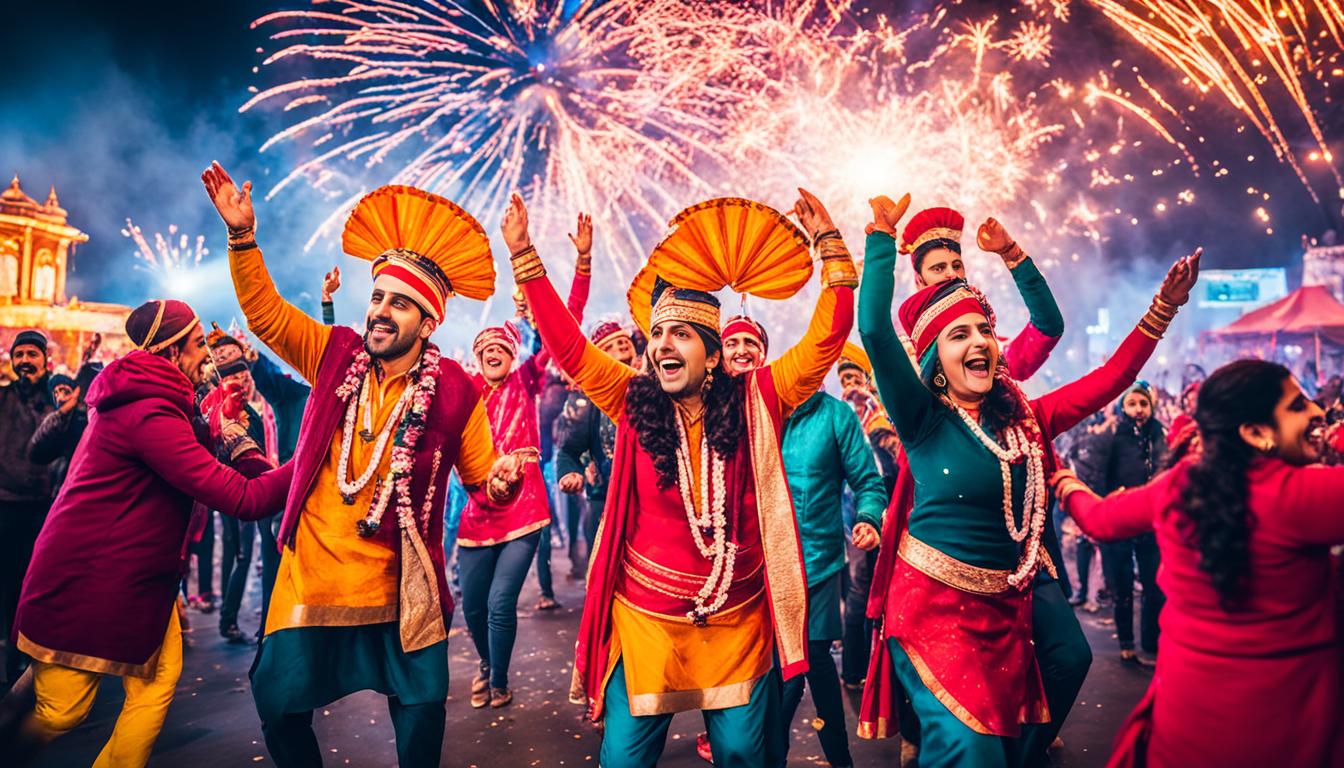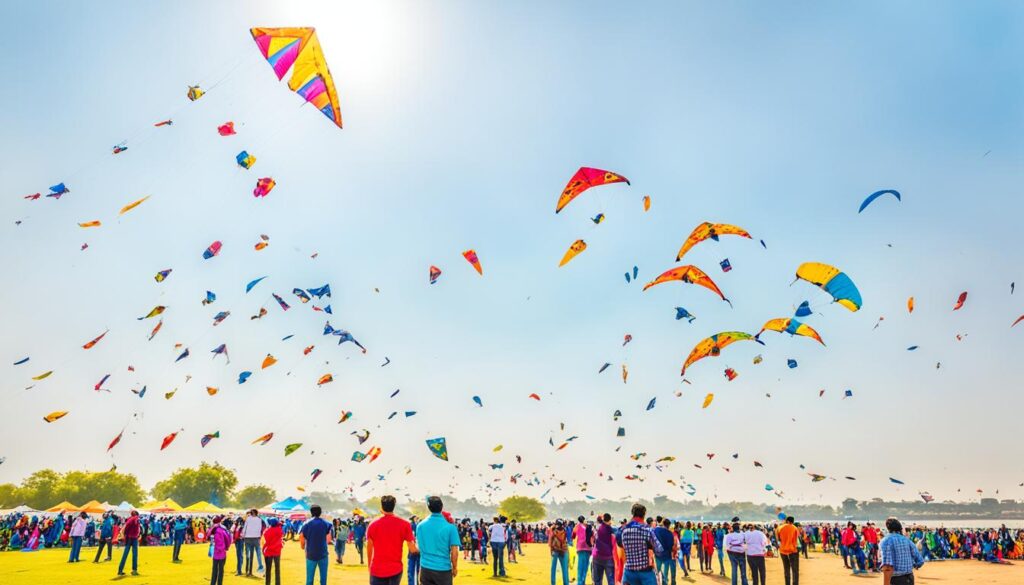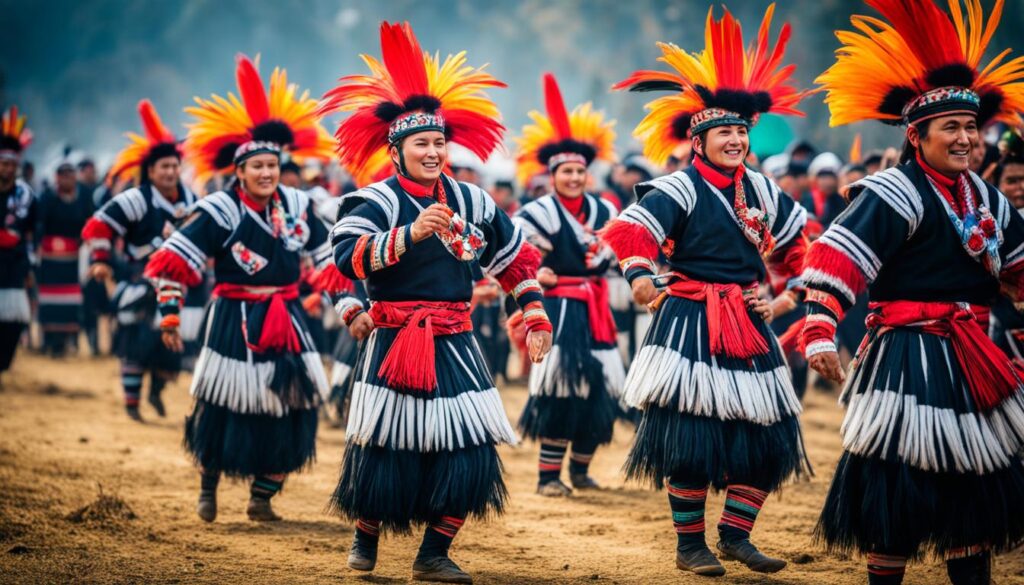
Experience Winter Festivals in India’s Glory
India, with its vibrant cultures, invites you to enjoy its winter festivals. The cooler weather turns the country into a place of joy. It celebrates its traditional festivals in Indian winter. Each one tells a story of heritage and fun. They show off traditional rituals and dance, making them some of the popular winter festivals in India.
Looking for spiritual vibes or fun fairs? The winter season has it all. It offers a unique mix of festivities. Be part of the crowd that gathers for the best winter celebrations India has. It’s a real journey through the country’s heart and soul.
Embracing the Cultural Majesty of Rajasthan’s Desert Festivals
The Rajasthan desert turns into a lively stage for cultural shows in winter. People from all over come to enjoy Rajasthan’s colorful festivals. The Jaisalmer Desert Festival and the Bikaner Camel Festival are top attractions. They showcase Rajasthan’s cultural traditions through dance, music, and folklore, highlighting this land’s greatness.
Jaisalmer Desert Festival: A Riot of Colors and Traditions
The Jaisalmer Desert Festival is full of life and color. During this festival, Jaisalmer is covered in bright colors. People wear traditional clothes and perform folk dances under the desert sky. The festival has camel races, turban tying contests, and more. These show the real culture of Rajasthan’s desert festivals.
Puppet shows and storytelling at the festival share old tales from the region. These stories are a big part of its heritage.
Bikaner Camel Festival: Celebrating the Ships of the Desert
The Bikaner Camel Festival is another key event in Rajasthan. It honors camels, called the desert’s ships, at the Junagarh Fort. At this festival, camels are decorated and join parades. There are camel dances, races, and beauty contests. The Bikaner Camel Festival shows off Rajasthan’s folk art and its people’s hospitality. It is a highlight of cultural events in India.
The Jaisalmer Desert Festival and the Bikaner Camel Festival showcase Rajasthan’s culture. They reveal the area’s festive spirit and traditions. These festivals invite everyone to see Rajasthan’s vibrant celebrations. They turn the desert into a place bursting with music, art, and happiness.
Celebrating Harvest with North India’s Lohri
The Lohri festival is more than a north Indian festival. It’s a display of vibrant culture. It’s among the most awaited traditional celebrations in India. In Punjab, Lohri marks the end of winter and start of the harvest season. Families and friends gather, enjoying the warmth of a bonfire. They celebrate with folk music, showing the harvest festival’s true spirit.
https://www.youtube.com/watch?v=l82l_swohEE
- Gathering around a big bonfire, sharing joy.
- Dancing to the beat of dhol, echoing Punjabi legends.
- Giving gifts, strengthening community ties.
- Enjoying harvest foods like gajak and sarson da saag with makki di roti.
In Amritsar, Lohri celebrations are vibrant. Performances and prayers fill the air. Each part of Lohri makes the harvest memorable. The Golden Temple adds to the festival’s spirit, glowing during Lohri.
| Celebration Aspect | Details | Significance |
|---|---|---|
| Bonfire | Large fire lit in the evenings. | Symbolizes the sun, warming and welcoming spring. |
| Folk Music | Traditional songs and dances, including bhangra and giddha. | Shows joy and gratitude for the harvest. |
| Feasts | Sharing meals of seasonal foods. | Represents Punjab’s rich agriculture. |
| Prayers | Offerings to the fire, wishing for prosperity. | Reflects the culture’s spirituality and thankfulness. |
These traditions highlight the Lohri festival’s warmth and joy. They show why it’s a deeply meaningful event in India’s traditional celebrations. Lohri embodies north India’s festive spirit, inviting everyone to enjoy its rich culture.
Soar High with the International Kite Festival in Ahmedabad
January brings a gentle breeze and with it, the excitement of the Ahmedabad Kite Festival. It’s not just a competition but a mix of creativity, skill, and unity. This international kite festival is celebrated widely, showing off the beauty of cooperation and art.
The Sky Speaks: A Kaleidoscope of Kites at Sabarmati Riverfront
The Sabarmati Riverfront becomes a focal point for countless visitors. Enchanting colorful kites fill the sky, showing off a variety of colors, shapes, and sizes. This scene is not only stunning to see but also a symbol of unity and joy.

Gujarat’s Pride: Blending Tradition and Modernity in Kite Making
In Gujarat, kite making is an art that brings life to the festival. Craftsmen across the state use both old and new methods to make kites. These kites tell the stories of their creators and pay homage to the festival’s innovative spirit.
| Feature | Traditional Kites | Modern Kites |
|---|---|---|
| Material | Bamboo and paper | Synthetic and durable materials |
| Designs | Classic patterns, reflective of folklore | Futuristic and custom graphics |
| Flying Technique | Time-honored string maneuvering | Advanced control mechanisms |
| Cultural Significance | Emblematic of Gujarati heritage | Celebration of cultural diversity |
The sight at the Ahmedabad’s Kite Festival is truly amazing. Along the Sabarmati Riverfront, people from all walks of life come together. Families, friends, and travelers join in a vibrant tradition that adds color to Gujarat’s cultural life. This international kite festival in India connects everyone under a bright sky.
Fiesta of Colors and Ethnic Melodies at Nagaland’s Hornbill Festival
The Nagaland Hornbill Festival is a bright showcase of ethnic diversity in India. It offers an unmatched experience of cultural celebrations in the Northeast. This yearly event shows the spirit of tribal festivals in India, focusing on Nagaland’s music and dance. Visitors enjoy an intense display of local arts. This shows the colorful life and traditions of the Naga tribes.

The festival draws tourists and helps tribes keep and share their old culture. It fills the town of Kisama for ten days from December 1st. There are many events to see, like the Hornbill National Rock Concert, Naga chilli-eating contests, and traditional archery.
Highlights of the Hornbill Festival include:
- Lively performances of traditional music and dance
- A wide display of handmade items that show the tribal festivals in India
- Food stalls that let you try various tribal cuisines
- An art contest that brings to life the cultural celebrations in the Northeast
| Tribal Performances | Art and Craft | Cuisine | Sports and Games |
|---|---|---|---|
| Choreographed Warrior Dances | Wood Carvings | Smoked Pork with Bamboo Shoot | Bamboo Pole Climbing |
| Folk Music Sessions | Weaved Handicrafts | Rice Beer | Greased Bamboo Pole Contest |
| Traditional Attire Showcasing | Beadwork Jewelry | Naga King Chili Delicacies | Naga Wrestling |
The Nagaland Hornbill Festival is a key event in the cultural celebrations in the Northeast. It highlights the ethnic diversity in India wonderfully. It keeps Naga society’s cultural essence alive. It also invites the world to experience Nagaland’s ancient rhythms.
“The Hornbill Festival is more than just a party; it honors Nagaland’s rich culture and the unity among its varied tribes.”
Honoring Traditions and Nature in Indian Winter Festivals
When winter comes to India, it’s more than just cooler weather. It is a season filled with celebrations that bring Indian culture to life. Across the country, people enjoy festivals that respect old traditions and nature’s generosity. In particular, the south and east of India celebrate the harvest and the end of winter in ways that reflect their deep cultural roots.
Pongal: The Tamil Thanksgiving to The Sun God
In Tamil Nadu’s green fields, Pongal is a special harvest festival. It is a joyous four-day event that gives thanks to the Sun God for the year’s harvest. Families come together to make ‘Pongal’, a sweet dish that stands for good fortune. At the same time, colorful folk dances and beautiful kolam designs decorate homes. These traditions highlight the festive spirit in Tamil Nadu and Assam.
Winter’s End Whispers with Bihu Magh in Assam
Meanwhile, in the northeast, Assam celebrates Bihu Magh, welcoming the end of winter. Bihu reflects a sense of gratitude and includes community dances and celebrations that show Assam’s cultural depth. People wear traditional clothes and perform Bihu dances to folk music, displaying India’s cultural richness. The celebrations are heartfelt, with delicious local foods bringing everyone together in a show of community joy.
Winter festivals across India not only honor traditions but also connect future generations with their cultural heritage. From Pongal’s warmth in the south to Bihu’s vibrancy in the northeast, each festivity showcases India’s diverse culture, resilience, and appreciation of nature’s gifts.
FAQ
What are some popular winter festivals in India?
In India, during winter, many festivals bring joy and color. These include the Jaisalmer Desert Festival and the Bikaner Camel Festival. Lohri, the International Kite Festival in Ahmedabad, and the Hornbill Festival in Nagaland are also celebrated. Pongal and the Bihu Magh festival in Assam are other major events.
What is the Jaisalmer Desert Festival?
Held in Rajasthan, the Jaisalmer Desert Festival showcases regional culture. Visitors enjoy camel races, puppet shows, and many cultural performances. It offers a unique glimpse into local life.
What is the Bikaner Camel Festival?
Rajasthan’s Bikaner Camel Festival honors these desert animals. It features decorated camels, thrilling races, and cultural shows. This festival highlights Rajasthan’s rich heritage.
What is Lohri?
Lohri is a key winter celebration in Punjab, India. It marks winter’s end and the harvest’s start. Families gather around bonfires, praying and celebrating with songs and dance.
What is the International Kite Festival in Ahmedabad?
From January 6th to 14th, the International Kite Festival fills Ahmedabad’s sky. People worldwide fly colorful kites, creating a beautiful display. It’s a truly mesmerizing event.
What is the Hornbill Festival?
Nagaland’s Hornbill Festival is a highlight of India’s winter. It presents the state’s cultural wealth through music, dance, and crafts. This festival draws visitors globally.
What is Pongal?
Pongal, or Makar Sankranti, celebrates the harvest in Tamil Nadu. It’s a thanksgiving to the Sun God, marked with rituals and feasting. Communities share in gratitude and abundance.
What is the Bihu Magh festival?
Assam’s Bihu Magh festival welcomes spring after winter. It’s filled with traditional music, dance, and feasts. Communities come together in joy, anticipating the new season.
Source Links
- https://www.trawell.in/blog/popular-winter-festivals-in-india
- https://www.indianeagle.com/travelbeats/most-celebrated-winter-festivals-of-india-in-december/
- https://www.indianholiday.com/blog/popular-festivals-india-winters/

Leave a Reply